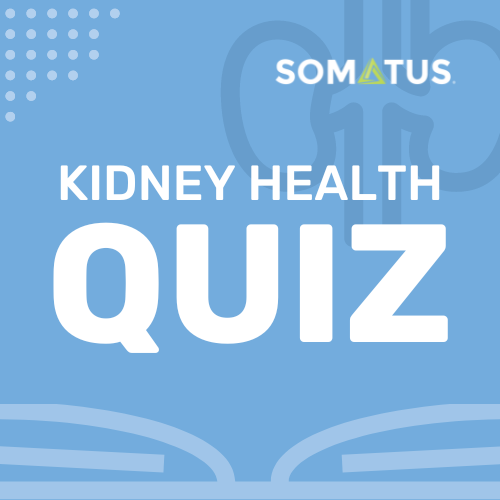Somatus Patient Blog
How Much Do You Know About Kidney Health?
Test your knowledge with a fun round of CKD trivia!

Are you a kidney expert? A kidney novice? If you were on Jeopardy and “Kidney Health” was a topic, would you sweep the category or avoid it altogether? Let’s test your kidney smarts and find out.
Empower yourself and get the facts about kidneys and chronic kidney disease (CKD) with our quiz below! If you need a refresher on some key CKD terms, our Kidney Terminology 101 blog will spark your memory.
Now, let’s get started!
Question 1: How many stages are there of CKD?
A. Three
B. Seven
C. Five
D. Four
Answer: C. There are five stages of kidney damage. CKD refers to all five stages, from very mild damage in stage 1 to End-Stage Kidney Disease, where the kidneys completely shut down. The stages of kidney disease are based on how well the kidneys can filter waste and remove excess fluid out of the blood.
Question 2: Which of the below is false?
A. Kidneys help remove waste and excess fluid.
B. Kidneys filter the blood.
C. Kidneys help make red blood cells.
D. Kidneys produce insulin.
Answer: D. The kidneys do many things (including answers A-C) to help keep our bodies in balance, but the pancreas is the organ responsible for producing insulin and maintaining healthy blood sugar levels.
Question 3: What are the three most important minerals to track when you have CKD?
A. Potassium, vitamin D, and sodium
B. Phosphorus, potassium, and sodium
C. Sodium, zinc, and vitamin D
D. Zinc, sodium, and manganese
Answer: B. To help manage CKD, it’s important to track your intake of certain minerals, which are elements that our bodies need to maintain balance and work normally. The three most important minerals to track when you have CKD are phosphorus, potassium, and sodium.
Keep going to learn more facts about CKD
and what some of the common causes are!
Question 4: True or False. There are three different types of access for hemodialysis (HD).
A. True
B. False
Answer: A. There are three types of access for HD. Two types, an arteriovenous fistula and arteriovenous graft, are vascular—which means they use your own blood vessels to create an access. The third type is a central venous catheter, which is placed in your chest.
Question 5: What is the most common cause of kidney disease?
A. Drug abuse and smoking
B. High blood pressure
C. Uncontrolled diabetes
D. B and C
Answer: D. In most cases, kidney disease is caused by other health problems that have done permanent damage to your kidneys over time. In the U.S., the leading causes of CKD are type 2 diabetes, high blood pressure—or both. Other causes include type 1 diabetes, cystic diseases, lupus, kidney stones, and other illnesses.
Question 6: Which of the below are symptoms of kidney disease?
A. Muscle cramps
B. Decreased urination
C. Swelling in your feet or ankles
D. All of the above
Answer: D. If your kidneys start to fail, you may have muscle cramps, swelling in your feet and ankles, decreased urination, trouble catching your breath, and trouble sleeping. You may also feel sick to your stomach or not feel hungry. If you experience any of these symptoms talk to your health care provider about getting tested for kidney disease and ways they help you.
You're becoming a CKD whiz. Keep it up!
Question 7: True or False. You can live a healthy life with only one kidney.
A. True
B. False
Answer: A. One healthy kidney can work as well as two! Most people live normal, healthy lives with one kidney. However, it’s important to stay as healthy as possible, and protect the only kidney you have.
Question 8: Your kidneys are part of which system in your body?
A. Reproductive system
B. Respiratory system
C. Digestive system
D. Urinary system
Answer: D. The urinary system’s function is to filter blood and create urine as a waste by-product. The urinary tract system is made up of two kidneys; two ureters, which are thin tubes that carry urine from the kidneys to the bladder; the bladder, which stores urine; two sphincter muscles that prevent urine from leaking; nerves in the bladder; and the urethra, which is the tube that carries urine outside the body.
Alright, let's see if we can stump you with this one.
BONUS QUESTION! Guess approximately how many gallons of blood your kidneys filter throughout the day.
A. 75 gallons
B. 28 gallons
C. 52 gallons
D. 200 gallons
Answer: C. Your kidneys may be small, but they do quite a bit of work! The kidneys are responsible for removing waste and excess liquid from the body by filtering them out from your blood. Your kidneys filter through about 52 gallons (200 liters) of blood throughout a given day!
It looks like you’re well on your way to becoming a kidney expert! Don’t forget to brush up on your CKD terminology from time to time so it’s fresh in your memory. The more you know, the better equipped you are to take charge of your kidney health and make informed lifestyle changes to prevent or delay CKD progression.